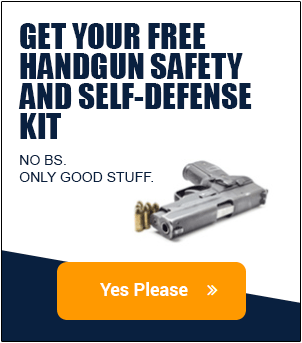If someone is just getting started with carrying a handgun, they may ask themselves, “Which caliber should I buy?” The choice depends on a variety of factors such as the size and weight of the gun and if you’re carrying for self defense. There’s no right and wrong answer, so much of the choice depends on a personal preference, such as how much recoil you’re willing to handle, how big of a gun you want to carry, and what kind of bullet performance you’re looking for. Let’s look at the difference between calibers and try to figure out which caliber is best for you.
If you’re carrying concealed, you probably are considering a caliber for personal defense. The smaller the caliber, the less “stopping power” they are going to have. Smaller calibers may be less effective, and not give you the confidence you need to stop an attacker in their tracks. However, bullet technology allows some smaller caliber bullets to expand when they hit their target, making them more like their larger caliber cousins. If you’re carrying for self defense, the ability to penetrate the attacker’s body is the critical issue. Bigger guns are better “stoppers,” but they are bigger and harder to hide.
Here are the pros and cons of five common calibers used for concealed carry.
.22
Small, lightweight firearms designed for .22 are easy to conceal. They have a limited recoil, allowing for quick followup shots. On the other hand, it’s a small caliber that won’t have as much stopping power as larger calibers. However, if you practice regularly and are accurate with your shot, a .22 can effectively stop an attacker. And, a .22 is better than not having anything at all if you’re being attacked. A .22 might not immediately stop someone, so with this gun, one shot probably won’t be enough.
.380
A step above the .22 in terms of stopping power in a handgun that is still typically small, lightweight, and easy to conceal. The .380 is a popular choice for concealed carry. If you’r focused on training yourself to be an accurate shot, the small caliber of the .22 and .380 might not be a drawback, but if you’re shooting all over the place, this might not be very effective. Similar to the .22, accuracy is important, and reliability may be an issue. Find one that has an accuracy of between 200 and 300 rounds in between misfirings.
9mm
This caliber offers increased stopping power over the .22 and .380 and is still easy to conceal. Recoil is larger but still manageable. With a larger bullet comes more recoil, and greater power requires more control and practice. 9mms are the most widely carried pistol caliber and ammunition is inexpensive.
.40
Most practiced shooters can easily handle a .40 or .45. Sharper recoil on this means that it may be harder to avoid the “flinching,” which means accuracy on your second shot will go way down. Many people in the gun community are thumbs down on .40 caliber and .45, but it is a good “in between” caliber that is smaller and less powerful than the .45 but more effective than the 9mm. There are plenty of firearm models to choose from that will fire a .40, so you should not have any trouble finding one that is comfortable for you. You get more rounds with a .40 than with the .45 with more effectiveness than the 9mm.
.45
The .45 has the greatest stopping power of all calibers listed here. However, .45s are large and heavy firearms that are not easily concealed. Recoil on this one is going to be more challenging. Many military and law enforcement officers carry .45s. Like the .40, the .45 is not a starter gun. Skill and precision is a must. .
Once you have determined the caliber handgun that best suits you, you still have to decide what type of bullet will work best.
We recommend a fluted hollow point style firearm for self-protection. The two most common types of rounds are jacketed hollow-point (JHP) and full metal jacket (FMJ).
A fluted hollow point will expand on impact, causing more damage than a full metal jacket. The expansion not only causes more damage, but decreases the likelihood the bullet will pass through the intended target, potentially striking an innocent bystander. Hollow points are more expensive than full metal jackets, so be sure to use FMJs for the majority of your practice shots.
The best caliber for you is the caliber you are comfortable and most accurate with. So, the question of which caliber should I buy depends on your personal answer to many questions. Some things you may not think about as well are any medical issues you might have. A gun with a higher recoil is going to be uncomfortable to use if you have arthritis, for example. Sure, a .22 has less stopping power than a .45, but if you cannot handle the recoil of a larger caliber, you should not be using it to protect yourself. Make sure to practice, practice, practice, so you can accurately place a .22 round to stop an attacker in their tracks.

